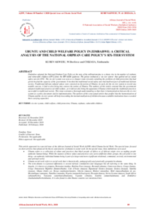ABSTRACT
Zimbabwe adopted the National Orphan Care Policy at the turn of the millennium due to a sharp rise in the number of orphans and vulnerable children (OVC) from the HIV/AIDS epidemic. The policy embraced a ‘six-tier system’ that spelled out six social safety nets for OVC. The six-tier system was seen as a cheaper route towards curtailing the problem of child protection that had grown beyond the capacity of the government. It invoked the traditional social safety nets that had been part of traditional African society. Traditional African cultural values were centered on the notion of Ubuntu. As such, for the six-tier system to record any notable success, it had to also bring into context the notion of Ubuntu. The authors of this article contend that the government adopted traditional practices of child welfare, yet it did not also bring the apparatus (Ubuntu) which made the traditional practices successful in traditional society. This issue warrants a thorough understanding so that there is harmonization between the six-tier system as a policy document and its implementation. The authors of this conceptual article thus proffer that the harmonization of Ubuntu and the six-tier system will help in avoiding the institutionalization of children because available institutions have exceeded their carrying capacities.

